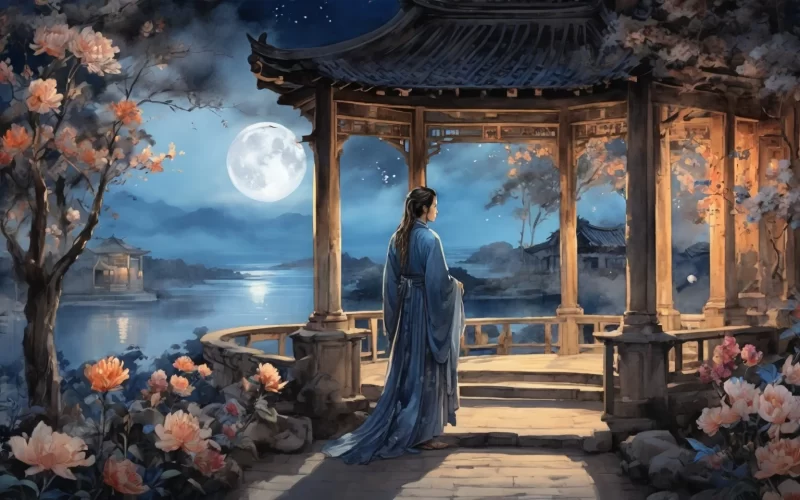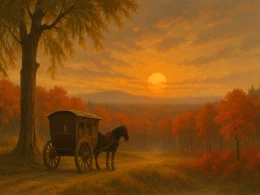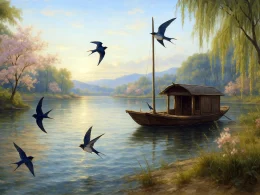Thinking only of their vow that they would crush the Tartars- -
On the desert, clad in sable and silk, five thousand of them fell....
But arisen from their crumbling bones on the banks of the river at the border,
Dreams of them enter, like men alive, into rooms where their loves lie sleeping.
Original Poem
「陇西行」
誓扫匈奴不顾身,五千貂锦丧胡尘。
可怜无定河边骨,犹是深闺梦里人。
Interpretation
This work, the second of four poems in Chen Tao's Longxi Series, was composed during the Tang Dynasty. Following the An Lushan Rebellion, the Tang state declined steadily, with constant border conflicts and endless casualties in the northwest frontier. Through a vignette of a fallen soldier and his wife—"separated by life and death, reunited only in dreams"—the poet expresses profound sympathy for the tragedies of war, exposing its devastation of countless families. It stands as a masterpiece of Tang frontier poetry with strong anti-war undertones.
First Couplet: « 誓扫匈奴不顾身,五千貂锦丧胡尘。 »
Shì sǎo Xiōngnú bù gù shēn, wǔ qiān diāo jǐn sàng hú chén.
"Sworn to sweep the Xiongnu aside, fearless of death— Five thousand sable-clad elites lost to barbarian dust."
The opening line's "sworn" (誓) captures the soldiers' tragic valor. "Sable-clad elites" (貂锦) symbolize military prestige, yet these honored warriors perish en masse. "Lost to barbarian dust" (丧胡尘) implies blood-soaked sands and unburied bones—no battle is depicted, yet the reader stands amid its carnage. This couplet glorifies bravery, setting up the emotional pivot that follows.
Second Couplet: « 可怜无定河边骨,犹是深闺梦里人。 »
Kělián Wúdìng hé biān gǔ, yóu shì shēnguī mèng lǐ rén.
"Pity the bones by Wuding River's flow— Still the man of her dreams in some far boudoir."
The tone shifts abruptly from heroic to elegiac. "Pity" (可怜) voices the poet's grief, while "Wuding River" (无定河, "River of No Certainty") becomes a grave-marker. "The man of her dreams" (梦里人) reflects the wife's enduring hope—her husband now bones, yet alive in her sleep. This jarring but visceral contrast deepens the tragedy: she may never know his fate, still whispering his name in dreams. With minimal strokes, the couplet etches war's cruelest human cost.
Holistic Appreciation
The poem's power lies in its stark juxtaposition: the soldiers' fearless sacrifice versus the wives' unbidden devotion. This rift between "heroic ideal" and "harsh reality" stirs awe for their courage, then horror at war's indiscriminate ruin. Without explicit condemnation, the poet uses bones and dreams to lay bare war's destruction of human bonds—a critique all the more piercing for its subtlety.
Artistic Merits
- Structural Precision: Four lines, two couplets, yet traversing passion to sorrow, battlefield to boudoir, reality to dreamscape.
- Symbolic Richness: Contrasts like "sable-clad elites" versus "dream man," "barbarian dust" versus "Wuding River" amplify the poem's tension.
- Dual Aesthetics: Blending frontier poetry's boldness with lyricism's tenderness, it becomes a genre-defying classic.
Insights
Beyond honoring the dead, this poem mourns shattered families. It reminds us that war severs life's most sacred threads—love, kinship, home. The poet's true critique targets not enemies, but war itself, and the rulers who trade lives for conquest. Such humanist resonance makes this Tang-era lament timeless.
Poem translator
Kiang Kanghu
Chen Tao (陈陶) was a poet of the Late Tang Dynasty, a native of Poyang, Jiangxi Province. Most of his poems are about landscapes, but there are also some that express his feelings of being unrecognized. He was famous for his poems and traveled to Chang'an, but he failed to get a scholarship.












